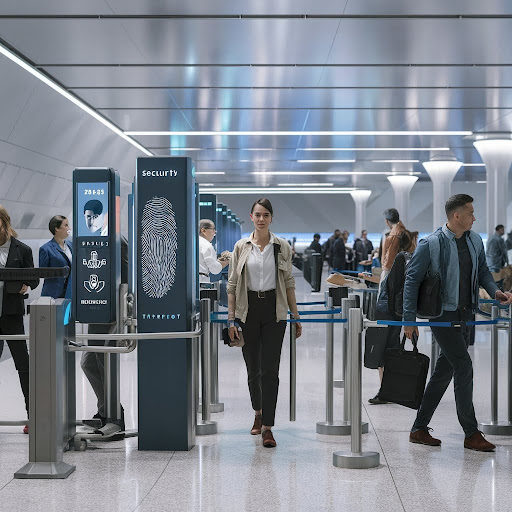Biometric verification systems are changing the travel industry by increasing security and providing a smooth passenger experience. However, this technology utilizes distinctive physical aspects, such as fingerprints, facial recognition, and IRIS scans to verify the identities. Biometric verification systems are becoming the main part of airports, hotels, and other travel-related services. Advanced technologies are becoming a vital requirement to make the travel process smooth, secure, and efficient. This article will explain how these types of systems increase the travel experience, providing the benefits of speedy check-ins and increasing security.
Accelerating Airport Check-Ins and Security
Biometric verification systems prominently minimize the time spent in airport check-ins and security underlines. Some traditional methods that include checking the physical IDs and boarding passes make the process slow and fallible. Therefore, the arrival of biometric authentication offers a speedy and accurate identity verification process. Even passengers can use facial recognition systems or fingerprint scanners to increase the check-in process. So, they can minimize their wait times and human error risks which makes the entire experience efficient and pleasing.
Increasing Security Measures
Security is one of the major concerns during traveling and only new technologies like biometric identity verification systems can address this issue. Many traditional methods for identity verification systems are weak, easy to exploit, and forgery. These verification systems are extremely secure because they depend on biological characteristics which is difficult to duplicate. Even airports and border control agencies utilize biometric ID verification methods accurately to recognize the individual. It guarantees that only an eligible or authorized person gets access bypassing the security checkpoints.
Hassle-Free Hotel Check-Ins
Some hotels are also adopting biometric verification systems to enhance the guest experiences. The emergence of biometric identity verification systems has replaced the traditional check-in methods—time-consuming during the peak hours. Guests can check in quickly and safely by using facial recognition systems or fingerprint scans. Besides, this technology increases the hotel check-in process and enhances security. With the incorporation of biometric systems, many hotels can provide a smooth and efficient check-in experience to their guests.
Customizing the Travel Experience
These systems enable a more customized travel experience, such as frequent travelers can instantly identify airports, hotels, and car rental services that offer customized services and recommendations. Even these systems can save and reclaim the traveler preferences that make everyone’s journey enjoyable and customized as per need.
Facilitating International Travel
Many international travelers rigorously stick with the security checks and long immigration process. However, biometric systems make this process simple by offering reliable and fast identity verification methods. Various companies are adopting e-passports that integrate with biometric data, allowing travelers to proceed with the immigration process speedily. The biometric ID verification minimizes the manual check requirements—the most time-consuming and demanding task.
Enhancing Loyalty Programs
The role of biometric verification systems plays an important role in accelerating loyalty programs in the travel industry. For instance, Airlines, hotels, and car rental services are also using biometric data to identify and recompense loyal customers. With the incorporation of biometric authentication in loyalty programs, many organizations can provide customized rewards to their travelers. Interestingly, some frequent flyers can also enjoy speedy onboarding and customized in-flight services.
Improving Health and Safety Protocols
The Covid-19 pandemic has culminated in the importance of traveler’s health and safety. The use of biometric verification systems can manage all deals by minimizing physical contact. Many touchless biometric systems, for instance, facial recognition and IRIS scans reduce the demand for physical interaction alongside virus transmission risks. These systems can merge with the health monitoring systems to confirm they meet the traveler’s health requirements.
Future Trends and Innovations
Let’s discuss some of the future trends of these innovations:
- The biometric verification future is extremely promising.
- The ongoing research has a major goal is to enhance the travel experience.
- Besides, these technologies are based on AI and ML algorithms to make the system more precise and efficient.
- Multimodal biometric systems utilization can fuse with the multiple biometric aspects for secure and feasible verification.
- The incorporation of biometric verification systems with digital wallets and various travel applications will make the entire process smooth–from booking to boarding.
- These innovations promise to provide a secure, efficient, and enjoyable travel experience to every passenger.
Wrapping It Up
So, biometric verification systems have changed the travel industry by enhancing security, efficiency, and customization. Airports and other travel agencies are constantly adopting biometric systems for smooth and secure check-ins and other protocols. The more technology will evolve, the more these systems will provide the number of benefits to enhance the security.

